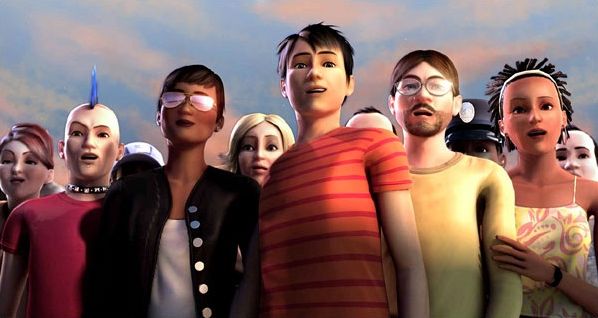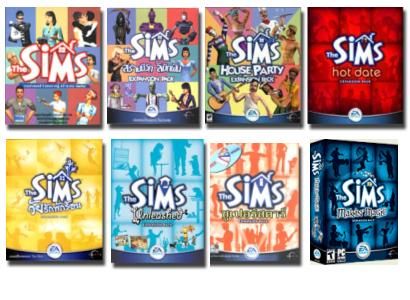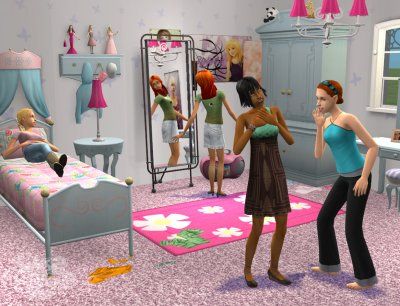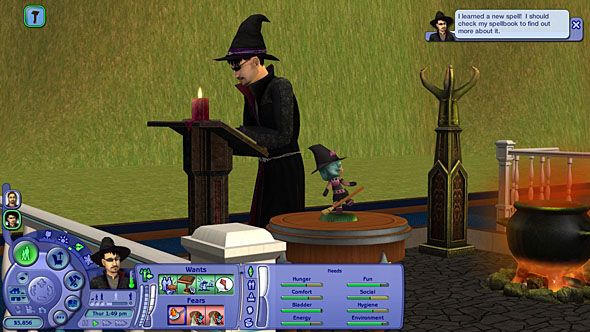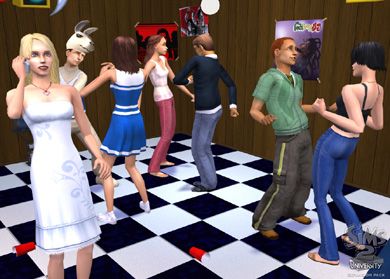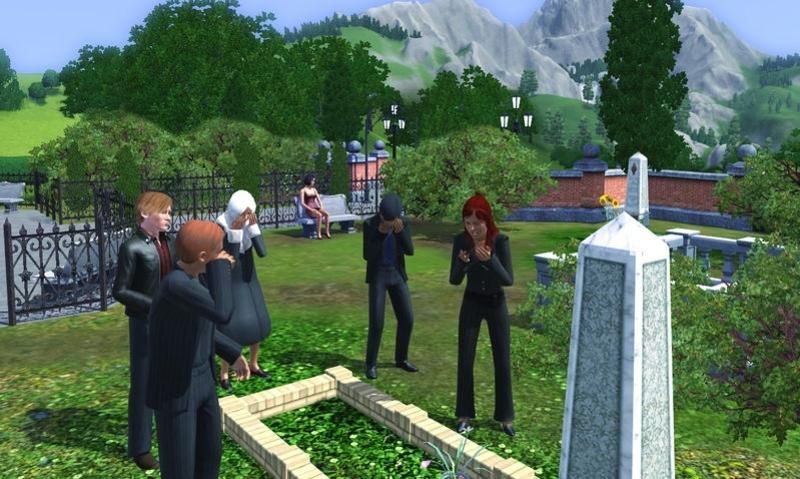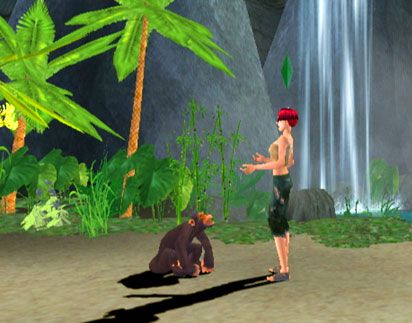Video games mean a lot of different things to a lot of different people. Some people like to battle monsters and otherworldly enemies, some like to shoot foreign soldiers in a modern military setting and some like to compete with opponents around the world in a consummate clash of skill. But some people like games for a very different and much simpler reason. They like to live a fantastic life that the real world estranges them from.
Not an altogether impossible life, like in one of the aforementioned games, but another life, a life not their own. They like to become fashion designers, throw numerous house parties, build their own houses from the ground up and be the most glamorous and popular folks in the city. For this group of people, The Sims is the most beloved gaming series of all time.
It has captured a very wide audience, women making up a large percentage of its player base. It is one of the longest running and best known gaming franchises period. It is so successful that it is in fact the best selling PC series of all time. Its popularity has made Guinness World Records. Yet in spite of this amazing success, not much of what takes place in a Sims game is beyond literal reach. Pull up a chair - it’s time once again for us to peruse the history of one gaming’s finest entries.
The Sims: Virtual Real Life
The Sims originated back in the year 2000, masterminded by the creator of the greatly successful SimCity series, Will Wright. SimCity is technically the seed from which the first Sims game grew, but the two series are quite different from one another. SimCity features a much greater focus on the management of a city, whereas The Sims focuses almost entirely on the management of people.
Players first created the characters they would manage, choosing from a variety of hair, eye and skin colors as well as clothes, accessories, styles and piercings. Players then defined their character’s personality with a combination of traits like playfulness and cleanliness. You could even choose an astrological sign.
After creating the character you so choose, you were placed smack in an empty stretch of grass where you would then create your house, reputation and dream life. Sims had to be kept happy via a combination of factors including hunger, hygiene, social stimulation and other things. Once a Sim was happy, it could engage in any number of activities including career planning, bodybuilding, partying, seeking romantic relationships and more. They could make themselves valuable employees by increasing their intelligence in things like repairing. Once Sims earned rewarding jobs, they could indulge in luxuries like swimming pools, mini bars, teppan yaki tables and more.
The possibilities the game presented were nearly limitless. The freeform gameplay had no end and players could get married and start families, hire cleaning services and even die. The game released to tremendous success, quickly surpassing Myst to become the best selling PC game of all time. Critics cited the addictive micromanaging of a fantastic alternate life as the games draw and its reception was mostly positive. The game had sold sixteen million copies globally by 2005.
The first Sims game sold so well that it warranted the release of seven expansion packs. The Sims: Livin’ Large added numerous items and new career paths. The Sims: House Party equipped players with a plethora of new items to create phenomenal parties. The Sims: Hot Date introduced new locations, items, scenarios and an enhanced relationship building system. The Sims: Vacation allowed Sims to travel to Vacation Island and partake in a variety of new activities. The fifth expansion pack, The Sims: Unleashed, introduced pets, gardening and a ton of new locations. The Sims: Superstar allowed players to seek stardom and riches by becoming performers and introduced a new location. The final expansion pack, the Sims: Makin’ Magic introduced many new elements including the ability to use magical spells, baking, new locations and more.
In 2003, the title made its way to home consoles being released for the PlayStation 2, Xbox and GameCube. The console versions featured enhanced graphical details and a two-player mode. The Sims: Bustin’ Out and The Sims: Urbz are two console-exclusive entries that mixed in some of the content from the subsequent PC version expansion packs. The Sims was an exceedingly popular game and it alone grounded the series indefinitely in gaming. It is particular since it was a success from the very beginning and never had to amass a following the way some other series have.
The Sims 2: Improving Upon Greatness
When development of The Sims 2 began in 2003, Maxis needed only to expand upon the already powerful gameplay of the first game. Expand they did. A more powerful engine allowed for greatly enhanced graphical capabilities. This same technical strength allowed players to engage in a fully 3D world.
Character creation and customization was greatly improved. Characters now collected aspiration points to further their end goals. Building and construction was upped and many locations were shipped with the game. Increased cooking and gardening capabilities furthered the gameplay. An enhanced in-game clock made use of weeks, and aging was more prevalent. Exercise affected a characters appearance and relationship building is better.
Refined controls allowed for more fluid and intuitive game play. Tons of new interactions were added for characters and objects. There were many new career paths and activities and the game in a nutshell offered a richer experience than the previous game, the end goal of any good sequel. The PC version of the game built a strong online community of modders and user generated content. An online store allowed for further customization. While this was a positive addition, it effectively rendered the console versions of the game far inferior.
The Sims 2 was released for multiple game consoles including the GameCube, PS2, Xbox, Game Boy Advance, Nintendo DS and PSP. Additionally, three games were released to enclose some of the additional content for the PC version. The Sims 2: Castaways has a number of things in common with Bon Voyage. The Sims 2: Pets for consoles is largely a reiteration of the PC expansion pack of the same name. The Sims 2: Apartment Pets is exclusively for the Nintendo DS and adds apartments in addition to pets.
Like the game before it, Sims 2 was so popular it received a wealth of additional content via expansion packs. The Sims 2: University added the young adult age, multiple items and allowed Sims to attend college. The Sims 2: Nightlife is similar to the popular Hot Date expansion for the original Sims in that it adds new locations, NPC, items and relationship building elements. The third expansion pack, Open For Business, allowed Sims to create their own businesses as well as added new areas, items and numerous new skills.
The Sims 2: Pets was similar to the Unleashed expansion pack for the original Sims because the majority of its new content was the ability to care for pets. Seasons introduced a new Sim type, new areas and new items with the biggest addition being the changing of seasons and related mechanics. The Sims 2: Bon Voyage allowed players to travel abroad and added a number of new activities and items, similar to The Sims: Vacation.
FreeTime added new careers, objects and a new gameplay element: hobbies. The eighth and final expansion pack for The Sims 2 is Apartment Life which added new activities, NPCs, a reputations systems, and areas. It also reintroduced magic similar to the Makin’ Magic expansion pack. In addition to the eight expansion packs, The Sims 2 for PC also received numerous “Stuff Packs” which added new themed items and objects.
Cumulatively, The Sims 2 has sold more than fifteen million copies and was the best selling PC game in its year of release. It was also very successful critically, garnering a commendable 90 on review aggregator Metacritic. Players had simply fallen in love with leading the extraordinarily ordinary lives of the Sims, and its popularity had only grown.
The Sims 3: King of the PC
The third numbered Sims game was revealed in 2008. The Sims 3 would feature a new open-world element that would make the player feel as though the game was truly about a world and not just about a lot. The superfluous map created a much more consummate environment.
This change also reduced the dramatic load times the series is known for. A ton of new content was created to give the characters more of an identity such as life goals. Opportunities reward players for completing certain tasks specific to their Sim’s personality type.
Traits dictate what kind of personality your Sim will have. Traits like artistic, genius and loner determine the life goals and aspirations each Sim will have. Some traits even possess exclusive benefits like the “Talk About Family” option available only to wielders of the “Family Man” trait.
The new moodlets have a similar function to aspirations and contribute to motivation. Karma powers give your Sims special powers depending on how much good or bad karma they have amassed including the ability to fix and repair things with no skill, more money and even negatively affect other Sims you dislike.
A full suite of life stages is available from the very beginning, including toddler, child, teen, young adult, adult and senior. Changes were made to make working jobs more involving, including travelling to job sites, similar to the Urbz. Players can make promises to their Sims to complete certain tasks such as finding a career in music or going to take a class on art. Sims age and die in a more involved ways, undergoing things such as a midlife crisis.
This game amassed the same thriving community as The Sims 2 but this time console users won’t miss out on the fun. The game utilizes an Exchange and a Sims store that allows players to go online and discover creations made by other players. Creating Sims is more comprehensive and detailed than ever.
When choosing fashions and styles for Sims, players can create formal, casual, evening and active looks for their Sims all at once. If a Sim goes to work out, it will automatically change into the predetermined active look. New tools make building and landscaping easier and more fluent than ever before.
Interactions between Sims and between Sims and objects have been improved. Your characters personality will dictate the way they act speak and gesture. Sims can access a variety of new activities in the cities like taking classes to learn skills faster. A new engine allowed once again improved graphics, animations and rendering.
When The Sims 3 released for PC in June of 2009 it became a best seller instantly, in the same vein of its prequel. The Sims 3 managed to sell nearly one and a half million copies in its first week alone. Critics praised the expanded world size and the seamless connection of one area to another, making the game for the first time feel like one continuous world.
The additions to character design and multiple new gameplay elements pleased longtime fans and also appealed to new audiences. The game currently stands with a Metacritic rating of 86 and is being called the best Sims game to date. It hit consoles in October of 2010 with a variety of additions, local multiplayer not among them. It did however add the karma abilities, and a wealth of licensed songs to the awesome soundtrack. The console versions were able to make use of the exchange to download the creations of other players globally. It also spawned numerous expansion packs, but only three as of yet : World Adventures, which is in the vein of Vacation; Ambitions, which is similar to Open for Business and Late Night which is similar to Hot Date. There is speculation that the console versions of the game may indeed receive the expansion packs sometime in the future thanks to the expanded online capabilities of current generation consoles. The Sims 3 has sold more than five million copies to date.
The Sims represents an entire demographic of gamers. It had captured the casual gamer before we were waving Wii-motes, Move controllers, or even our hands in front of our TVs. It represents both the least nerdy and the nerdiest of all gamers - a group of people so unique that they would probably not play video games at all were it not for the Sims. As the best selling PC game ever, its popularity is without question. It allows players to lead the life that they want - no matter how ordinary or extraordinary that life is. The Sims is a monumental franchise that defined the casual gamer and I’m glad to be able to credit it in this way.
Thanks for embarking with me again on the history behind gaming’s most prized efforts.



